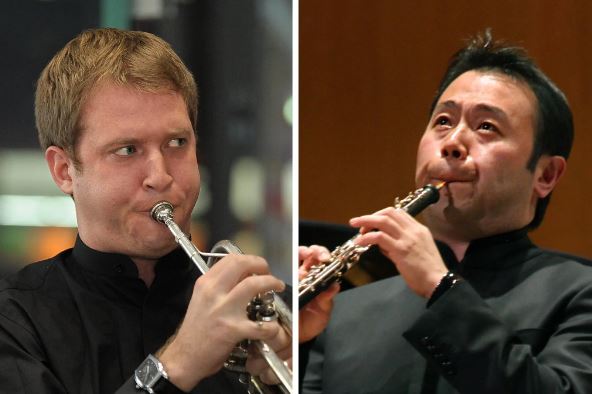The New York Philharmonic announced on Monday that two musicians it had previously attempted to dismiss in 2018, but were reinstated after a legal challenge, would be temporarily excluded from rehearsals and performances following the emergence of misconduct allegations detailed in a recent magazine article.
The orchestra stated that Liang Wang, the principal oboist, and Matthew Muckey, the associate principal trumpet, would not participate in any activities as the organization grapples with the fallout from revelations published in a New York magazine article on Friday.
The article featured Cara Kizer, a former Philharmonic horn player, who publicly recounted an incident during a 2010 tour in Vail, Colo. Kizer reported to the Vail Police Department at the time that she had been sexually assaulted following an evening with Wang and Muckey, alleging that she was given a drink she believed to be drugged. Despite her complaint, no charges were filed against the accused musicians, both of whom deny any wrongdoing.
In 2018, the Philharmonic sought to terminate the employment of Wang and Muckey, citing reports of misconduct following an investigation. However, their dismissal was challenged by the musicians’ union, leading to their reinstatement in 2020 after an independent arbitrator ruled that their termination lacked just cause.
Gary Ginstling, the Philharmonic’s current president and chief executive, acknowledged the impact of the recent article, stating that Wang and Muckey were currently not performing with the orchestra. Ginstling refrained from specifying when they might return or whether the orchestra would pursue their termination again, citing the binding nature of the arbitration ruling.
The orchestra committee, representing the players, expressed support for Kizer and voiced concerns about a culture of indifference towards musician complaints of sexual harassment and assault. They urged management to take decisive action to foster a safe workplace environment.
Sara Cutler, president and executive director of Local 802, the musicians’ union, emphasized the need for further steps beyond Wang and Muckey’s temporary removal from performances to address systemic issues within the organization.
Meanwhile, Kizer, who did not obtain tenure with the orchestra, shared her appreciation for the support received since the article’s publication, noting the resonance of her experience with other survivors in the industry.
Legal representatives for Wang and Muckey maintained their clients’ innocence, highlighting the arbitrator’s ruling and expressing confidence in their eventual return to the orchestra.
In a collective statement posted on social media, the orchestra’s musicians denounced all forms of misconduct and reaffirmed their commitment to creating a safe environment for women within the organization.
The New York Philharmonic’s response underscores the complexities surrounding allegations of misconduct and the challenges in addressing systemic issues within classical music institutions. As the orchestra navigates this turbulent period, the focus remains on ensuring accountability, supporting survivors, and fostering a culture of respect and safety for all members.

